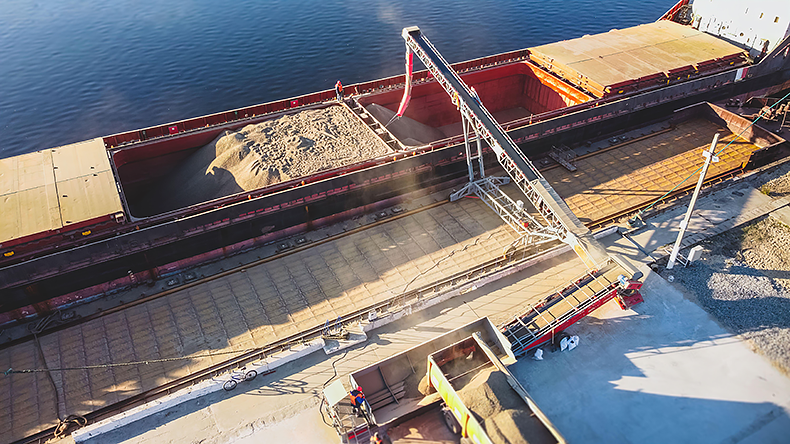Russia has agreed to renew a deal aimed at providing Ukrainian grain to the rest of the world but only for another 60 days, Deputy Foreign Minister Sergey Vershinin said on Monday after talks with the UN.
Moscow has been threatening to derail the agreement that is crucial for world food security
The Russians have refused to extend by the usual 120 days. “The Russian side … does not object to another extension of the Black Sea Initiative after its second-term expiration on March 18, but only for 60 days,” Mr Vershinin said in a statement issued by the Russian mission in Geneva.
After talks at the UN’s Palais des Nations, Moscow said it wanted to see “tangible progress” on a parallel agreement on Russian exports before the deal comes up for renewal again.
Brokered by the UN and Turkey in July to prevent a global food crisis by allowing Ukrainian grain, blockaded during Russia’s invasion, to be safely exported from three ports, the Black Sea Grain Initiative has since been renewed every 120 days.
A senior Ukrainian government official involved in the talks on the initial deal said Kyiv had considered a 60-day extension to be in breach of the agreement’s terms.
“The agreement clearly states that extensions are possible for a minimum of 120 days,” he told Reuters. “To extend it for 60 days, you have to amend the deal.”
UN spokesman Stephane Dujarric said: “We’re doing everything to preserve the integrity and ensure the continuity of the agreement.”
He said the UN was working with Russia, the private sector, the EU, Britain, the US and others to maintain the flow of agricultural exports, adding that “obviously a lot of these things are not within the decision-making powers for the United Nations”.
More than 24.1 million tonnes of grain have so far been exported under the deal, the UN says. Russia and Ukraine are among the world’s top grain and fertiliser exporters.
But Russia has claimed in the past few weeks that the deal should make it even easier for its grain and fertiliser export deliveries, which it says have been slowed down by western sanctions.
Mr Vershinin said Russia’s “further stance will be determined upon the tangible progress on normalisation of our agricultural exports, not in words, but in deeds.
“It includes bank payments, transport logistics, insurance, ‘unfreezing’ of financial activities and ammonia supplies via the Tolyatti-Odessa pipeline.”
Yet the EU and the US have publicly dismissed Russia’s claims, highlighting that they have not imposed any sanctions on Russia’s agricultural sector.
An EU diplomat told The National that Russia can export grain and fertilisers via EU ports after individual countries receive permission from European Commission.
These approvals are granted on a case-by-case basis to avoid loopholes and misuse by Russian oligarchs, they said.
“The European Commission has made it clear in its guidance that the transfer of Russian fertilisers and animal feed to third countries, as well as the financing or financial assistance related to such transfer by EU operators or via EU territory is permitted,” the EU Commission’s lead foreign affairs spokesman Peter Stano told The National.
Mr Vershinin led the Russian delegation in talks with UN humanitarian chief Martin Griffiths and Rebeca Grynspan, head of the UN’s trade and development agency.
“The comprehensive and frank conversation has once again confirmed that while the commercial export of Ukrainian products is carried out at a steady pace, bringing considerable profits to Kyiv, restrictions on the Russian agricultural exporters are still in place,” Mr Vershinin said.
“The sanctions exemptions for food and fertilisers announced by Washington, Brussels and London are essentially inactive.”
Nearly half of the exports shipped under the grain deal are corn and more than a quarter are wheat, according to UN data.
About 45 per cent of the exports went to developed countries. The biggest recipient was China, followed by Spain, Turkey, Italy and the Netherlands.
Quantifying the impact of western sanctions on Russian agricultural exports is difficult because Russia stopped sharing its export figures at the start of the war in February last year.
Food security experts have previously told The National that data provided by Russia’s trading partners indicate that its exports of wheat and of some fertilisers increased last year.
One Russian export that dropped sharply was ammonia, which was referenced by Mr Vershinin in his statement. Yet the drop was not because of sanctions but because a pipeline transporting ammonia from Russia’s Volga region to Ukraine’s Black Sea port of Odesa was shut down shortly after the start of the war.
Food and Agriculture Organisation figures indicate that ammonia exports started picking up again in December, possibly because Russia also exports the substance through the Baltic Sea.

